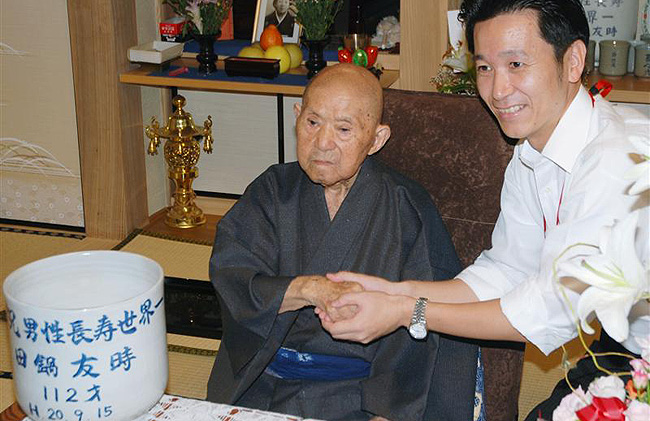
Japan has the oldest life expectancy in the world. That means people in Japan live a really really long time. Men live to 79 years old. Women live a little over 86 years old. What in the world causes Japanese people to live so long?
After WWII, Japan had one of the lowest life expectancies in the world, which suggests it's not genetics that keeps them alive for so long (the guy in the picture above just turned 113). It's not even that Japanese people visit doctors 12+ times a year. The answer is something else, and it's something you can do as well to increase your own life expectancy (and get healthier, too)
The Japanese Diet
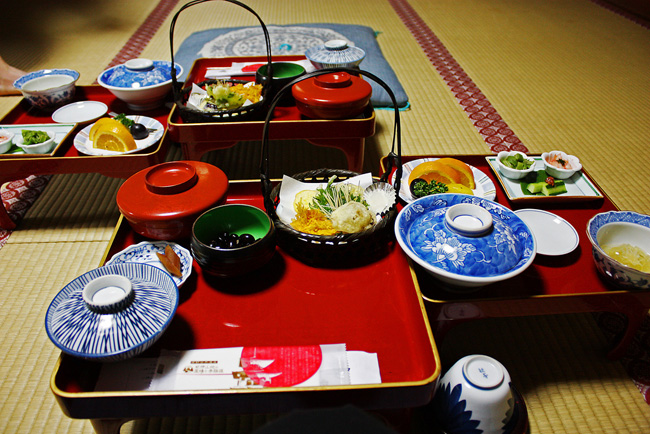
I'm no diet expert, but I can tell you that the things Japanese people eat are a lot healthier than the things Americans tend to eat. It's not just their diet in general, though. We can break it up into several parts. If you want to live a long time, avoid heart disease, and feel healthy, perhaps a Japanese style diet is for you. Overall, it's just way healthier. Here's why:
Fish Vs. Red Meats: Japanese people don't eat nearly as much red meat. Red meat has a lot more cholesterol than fish, which causes you in your later years to have a much higher chance for heart disease, heart attack, stroke, and other fun things. In Japan, fish is the primary "meat" to eat, which means not only do they keep their cholesterol lower, but they also get healthy fish oils, too. Now, there's probably something to be said about the nasty stuff that can come with fish (i.e. mercury), but no matter what you eat you're going to be getting something "fun."
Less Milk, Butter, Dairy: People aren't really meant to do dairy their whole life. Although non-fat milk is pretty healthy, a lot of people drink 1% and 2% milk. The amount of fat and cholesterol in those is pretty astounding and will kill you slowly. Japanese people don't really do dairy all that much, which means they avoid all the extra cholesterol.
Rice: Rice is eaten with almost everything and is high in nutrients (there are special rice strains in Japan that have been created to have more nutrients than normal rice, even). It's also low in fat and helps fill you up. Now, to make this even better (for yourself), you should try to mix in some brown rice as well. A lot of people don't like this, but it'll help you get some more whole grains.
Lots of Soy: Tofu, bean sprouts, and so on are awesome for getting you proteins and help reduce heart disease and high blood pressure, a couple of things that kill a lot of Americans. Soy products are really healthy, and an awesome alternative to meats, milks, and other "unhealthy" things.
Tea: Japanese people drink a ton of tea. Americans drink a ton of coffee. While there's something to be said in regards to "everything in moderation," I feel like one cup of tea is going to be better for you than one cup of coffee, especially when we're talking larger amounts. Green / Oolong Tea is full of antioxidants (good for fighting that cancer thing), and apparently helps break up oils in the digestive system, keeping those bowels happy.
Seaweed: Mmm, seaweed. It's full of iodine and other nutrients you don't get as much of anywhere else. So incredibly healthy. Also supposed to help fight against many kinds of cancers, too.
More Vegetables: Vegetables tend to be a big part of every meal, not an afterthought or "oh, I should add a vegetable to this steak dinner" kind of thing. Everyone knows that vegetables are healthy and good for you. What else is there to say?
Smaller Plates: Here's a trick. If you're looking to lose weight, get rid of your big plates. Small plates cause people to eat smaller portions, which causes people to eat less. So many studies have been done on plate size and how much one eats, and there's a surprising correlation between the two. Japanese tend to serve food on smaller plates which means they don't overeat and get fat, which, of course, reduces chance of heart attack, heart disease, stroke, and other ailments.
Calories: According to Greg O'Neill, director of the US National Academy on an Ageing Society, Japanese people eat a third of the calories Americans eat. Now, Japanese people do tend to be smaller, so this kind of makes sense, but on the other hand Americans tend to eat too many calories. Next time you do fast food, look at the calorie counts. It can get pretty ridiculous, sometimes.
What You Can Do: Eating healthier isn't always easy. We get used to what we eat, and making a shift is hard. One of the best things you can do, though, is decrease the amount of red meats you eat. They lead to all kinds of problems later on, and it's pretty easy to avoid. You don't have to stop eating red meat all together, but if you can really decrease the amount your body will thank you. Also, for all you addicted coffee drinkers out there, switch to tea. There's a reason why older people are being forced (by doctors) to quit drinking so much coffee. Tea also has caffeine (I know, not as much, but you'll survive) and is generally just a lot healthier. Drink it every day!
Walking Vs. Sitting
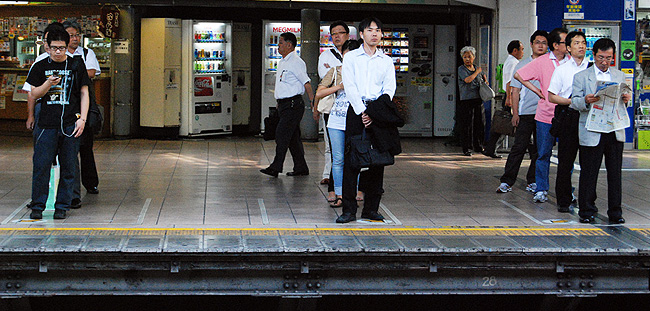
Not only do Japanese people eat well, but they stand and walk way more than the average American. In America, most people tend to drive everywhere. Then, after they drive, they sit for long periods.
The Commute: A large portion of Japanese people walk, bike, and take the train to work (or wherever they need to go). Cars are kind of a luxury, and it's almost easier to take a train anyways (train system is awesome). This means Japanese people are standing up for longer periods of the day, whether that means they're walking / biking to the train station, or standing up in the train because there isn't room to sit down. There have been plenty of studies done showing the correlation between how long you sit down per day and how likely you are to die early. Basically, if you stand up more every day, you'll probably end up living longer. In Japan, standing and walking is just a necessity, while in American you have to go out of your way to do it. If you want to live longer, try and stand up for a few hours every day. Maybe the crazy Canon CEO isn't just being evil, he's helping his employees live longer!
Squatting While You Poop: Apparently, it's also healthier to squat when you poop. Although this is becoming less and less the case, many Japanese toilets require you to squat, which has its own health benefits (even if it takes some practice). Apparently (I won't get into too much detail here), squatting helps with your digestive system and actually help you to avoid hemorrhoids. While hemorrhoids are pretty common in Western countries, they're nearly nonexistent in Asian, squatting countries. Back in 1978 they even got Jimmy Carter a squat toilet because his hemorrhoids were so bad. I don't want to talk too much about poop here, so if you want to read more you can.
What You Can Do: It's probably too hard to squat on top of your Western toilet when you poop, but you definitely can stand up and walk around more often. At the very least, try to stand up while you work (instead of sitting down). Just standing will help you stay healthy and live longer, even if you aren't moving around. We aren't made to be sitting around all day long
Cleanliness
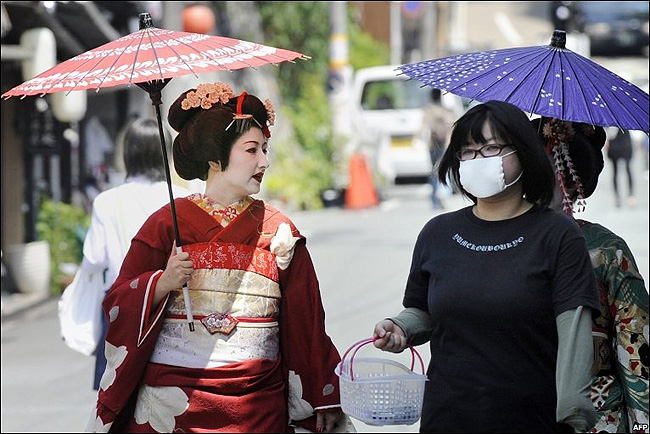
Japan is probably one of the cleanest nations in the world. There's almost an obsession with it in some cases. There's no doubt that cleanliness leads to healthiness (we learned that in the great plagues back in the day). If you live in a clean house, and wash your hands, you should be okay. It doesn't always seem like a cultural norm in America to wash your hands and shower every day (especially depending on where you are), but keeping clean and living around clean people will keep you healthy and help you live longer. It'll help you to avoid disease (especially important when you're old) and keep you from getting sick.
What You Can Do: Just wash your hands, it's that simple.
The Family & The Social
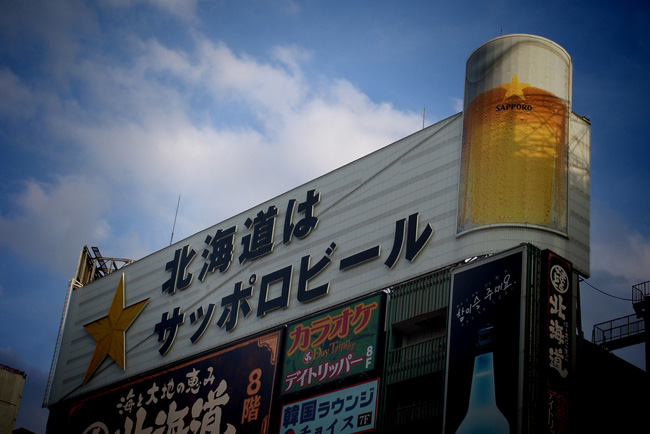
Taking care of grandma (and sometimes grandpa): In Japan, the oldest kid is supposed to take care of the parents when they get old. The parent(s) live with the kid and help out around the house (until they get too old to, I suppose). Although this is changing a bit and fewer kids are helping out with their parents, it's still really common. Having your kid(s) around, and grandkids around has to be a pretty nice psychological boost for the old grandma or grandpa, urging them to live longer and enjoy their time with their family. Plus, since they're helping out around the house, it means they're moving around (walking is important, right?), doing things, and staying active. Although I didn't find any data to support this, I can't help but see this as being a perk if you're an old person in Japan. Being old and living in a retirement home would be depressing, and probably helps a lot of old people lose the will to live as long.
Hanging out, drinking, and socializing: I'm not saying that drinking a lot is good for your health (though some studies say it's not all that bad, showing that drinkers actually live longer than non-drinkers, overall), but the socializing that goes along with it is. When it comes to business in Japan, employees are often required to go out and socialize, drink, and have fun after work. Although this takes away from sleep time (probably not as good for people who want to live long), socializing is really important for your psychological health. The better that is, the more you'll enjoy life and keep on living. By doing this you make friends, know more people, build a network, and so on. This means you have more friends later on in life, which means you'll enjoy life more when you're older too. When you enjoy life, you just want to live longer. It's as simple as that.
What You Can Do: While you probably can't force your kids into taking you into their home when you get older, you can get out there and make friends. The more you socialize the better you'll feel about life and the more social support you'll have later on.
How To Live Forever
If you want to live for a long time, all you really have to do is change your lifestyle a bit. Most of it comes with eating the right foods, but you shouldn't forget to stand up a bit too (even if that means standing up at your desk while working, or something). Japanese people don't live long because they have better genes – it's all lifestyle, and it's all a choice (or, for them, a culture, which I guess makes it easier). You can make shifts as well, and increase your life expectancy by 5-10 (good) years. Old Japanese people have so much more energy compared to old people in America (just an observation, not a fact). I think they must be doing something right.
Long live Japan! … Literally.
